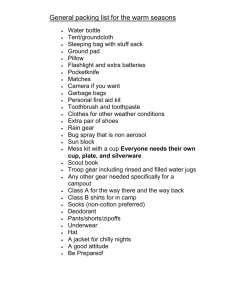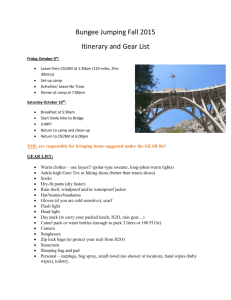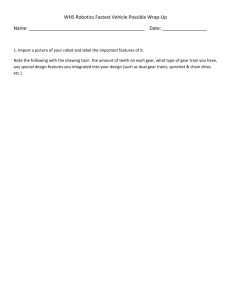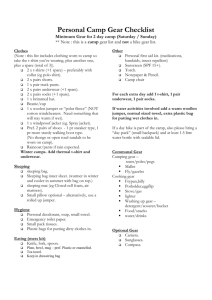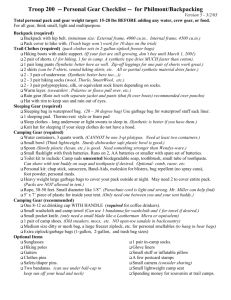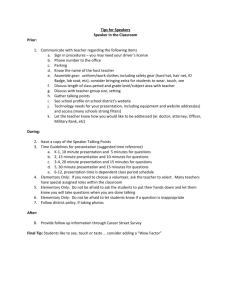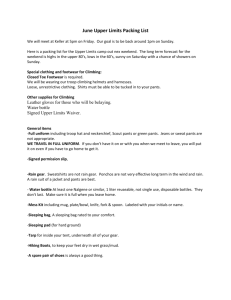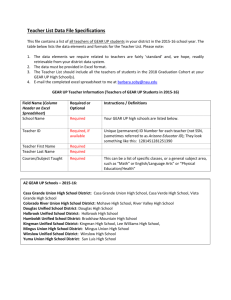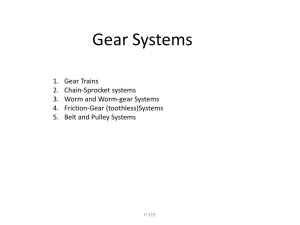Field School 2005 Field Equipment Checklist
advertisement
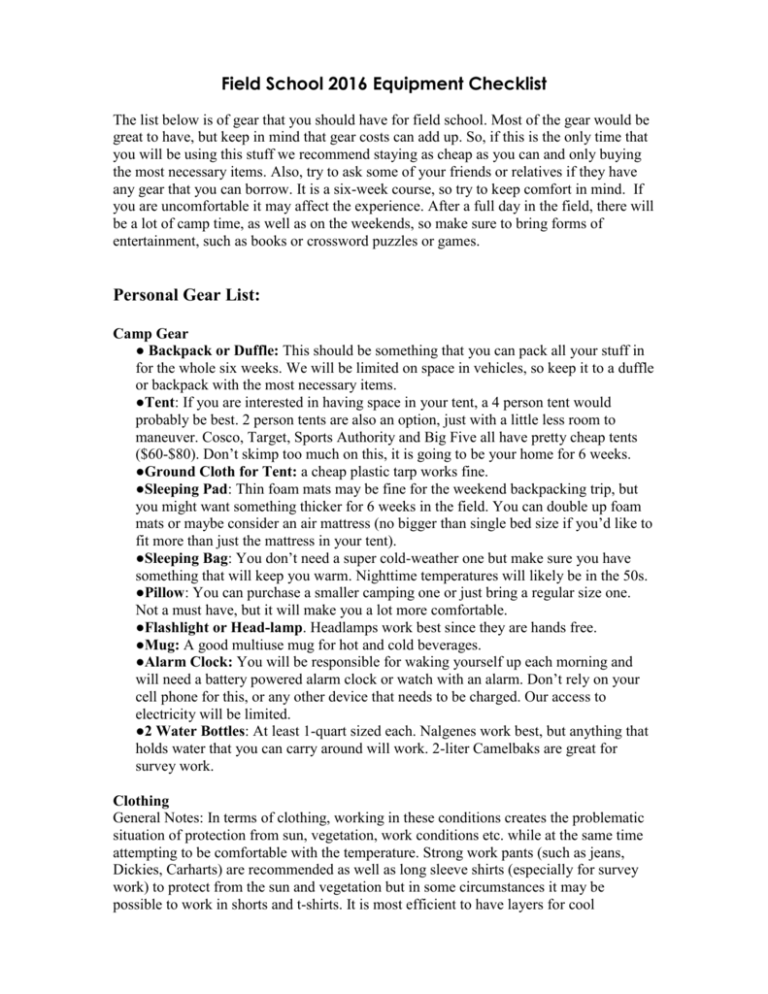
Field School 2016 Equipment Checklist The list below is of gear that you should have for field school. Most of the gear would be great to have, but keep in mind that gear costs can add up. So, if this is the only time that you will be using this stuff we recommend staying as cheap as you can and only buying the most necessary items. Also, try to ask some of your friends or relatives if they have any gear that you can borrow. It is a six-week course, so try to keep comfort in mind. If you are uncomfortable it may affect the experience. After a full day in the field, there will be a lot of camp time, as well as on the weekends, so make sure to bring forms of entertainment, such as books or crossword puzzles or games. Personal Gear List: Camp Gear ● Backpack or Duffle: This should be something that you can pack all your stuff in for the whole six weeks. We will be limited on space in vehicles, so keep it to a duffle or backpack with the most necessary items. ●Tent: If you are interested in having space in your tent, a 4 person tent would probably be best. 2 person tents are also an option, just with a little less room to maneuver. Cosco, Target, Sports Authority and Big Five all have pretty cheap tents ($60-$80). Don’t skimp too much on this, it is going to be your home for 6 weeks. ●Ground Cloth for Tent: a cheap plastic tarp works fine. ●Sleeping Pad: Thin foam mats may be fine for the weekend backpacking trip, but you might want something thicker for 6 weeks in the field. You can double up foam mats or maybe consider an air mattress (no bigger than single bed size if you’d like to fit more than just the mattress in your tent). ●Sleeping Bag: You don’t need a super cold-weather one but make sure you have something that will keep you warm. Nighttime temperatures will likely be in the 50s. ●Pillow: You can purchase a smaller camping one or just bring a regular size one. Not a must have, but it will make you a lot more comfortable. ●Flashlight or Head-lamp. Headlamps work best since they are hands free. ●Mug: A good multiuse mug for hot and cold beverages. ●Alarm Clock: You will be responsible for waking yourself up each morning and will need a battery powered alarm clock or watch with an alarm. Don’t rely on your cell phone for this, or any other device that needs to be charged. Our access to electricity will be limited. ●2 Water Bottles: At least 1-quart sized each. Nalgenes work best, but anything that holds water that you can carry around will work. 2-liter Camelbaks are great for survey work. Clothing General Notes: In terms of clothing, working in these conditions creates the problematic situation of protection from sun, vegetation, work conditions etc. while at the same time attempting to be comfortable with the temperature. Strong work pants (such as jeans, Dickies, Carharts) are recommended as well as long sleeve shirts (especially for survey work) to protect from the sun and vegetation but in some circumstances it may be possible to work in shorts and t-shirts. It is most efficient to have layers for cool mornings and hot days as well as more comfortable camp clothes for off duty hours. Socks, t-shirts, and underwear are three things to bring plenty of…and remember, everything will be getting extremely dirty and worn out. Field Clothes: ●Pants: Old jeans and khakis work well in the field. Comfortable pants make a huge difference in the field. If you have to purchase some cheap jeans, workpants, etc., try a store like Walmart, Kmart, or the thrift store. ●Shirts: Same idea here as with the pants. Old t-shirts/tank tops work best, as the potential to re-wear after field school is low. Remember, the days will be hot, so stick to materials that breathe well. ●Socks: The type of socks are really up to you, you don’t necessarily need thick wool ones, but it wouldn’t hurt to have some quality pairs. Try to bring a week’s worth of socks. ●Shoes: Old tennis shoes work out great. Hiking boots are fine and can protect your feet if you plan to go on hikes and for survey work. The key is comfort, there is nothing worse than hurt feet. While working you will need to be wearing closedtoe shoes. ●Hat: A hat of some sort will protect you from the sun and help to keep you cooler during those hot days. A bandana works well for this, too. Straw hats, baseball hats, cowboy hats, etc. ●Top Layers: A good windbreaker which is nice and light will help out a lot. Fleece is light and warm and fairly cheap. Cotton Sweatshirts are o.k., too, just make sure you will be warm if the nights get cool. ●Rain Gear: A good set of raingear is important if it rains. Any hardware store should have a 2 or 3 piece set of raingear for under $20. You may look like a fisherman but you will be toasty warm and dry when it rains. We may also use raingear if we wet-screen. Camp Clothing: Bring a couple changes of clothes that will be comfortable when we are hanging out at camp after work. Temperatures will be hot during the day and cool at night, so bring some comfortable clothes with that in mind. Field Gear: The first items listed are required. Items in the second list are optional. Make sure to label all your gear (initials or a personal symbol you can write on it works well). Required Gear (some gear can be found at cspoutdoors.com: Click on the Archaeology and Geology Gear tab): ●Pointy Trowel: A Marshaltown size 5 trowel is the standard model people go for. Look for it with masonry equipment at a hardware store, NOT in garden supplies. ●2m Folding Rule and 5m Metric Tape: Make sure they are metric! It’s okay if they have standard and metric. ●Line Level: Plastic is fine, should cost about $2. ●Paint Brush: Nice to have at least one, used is fine. ●Field Bag: People do different things here, most common is just an old school backpack. An electrician’s bag or tool bag can also be handy. Just make sure you have something that you can put all of your stuff in. ●Reusable Lunch Box or Bag: This will minimize trash. ●Work Gloves: Leather or imitation leather gloves will work best. They can get worn out easily, so you may want to bring two pairs. ●A bound field journal: You will be required to keep a journal while in the field. The 6x8inch ones (composition books) with the black and white covers that most school bookstores sell is fine. ●Small Root Clippers ●Sharpie Pen: Black, fine point. ●Pencils: Mechanical or regular. Bring lots of cheap ones, they get lost. Optional but Recommended Gear: ●Flat-nosed Trowel: Great for edging, if you are going to get one optional piece of equipment get this. ●Knee Pads or Foam Gardening Pad: This isn’t required, but is highly recommended. You’ll spend a lot of time kneeling while you excavate and the ground can be very unforgiving. ●Ice Pick or Dental Tools ●Flagging Tape ●String ●Small Hand Broom and Dustpan ●Toothbrush: Great for cleaning off artifacts. ●Compass: If you are going to buy a compass make sure it is declination adjustable. If it is not you are out of luck. A good Silva compass is the best, particularly the Silva Ranger. ●Clipboard General Gear: Required Gear: ●Sunglasses ●Sunscreen: It will be sunny and hot! Make sure to bring lots of sunscreen, sunburns are the worst! ●Aloe Vera/Sunburn Cream: Just in case, this will make your life much better if you do get a sunburn. ●Bug Spray ●Personal Medications ●Personal Toiletries ●Batteries for everything Optional Gear: ●Swimsuit: you’ll have access to the river for swimming. ●Towel ●Sandals or Flip Flops ●Gum / Candy / Snacks / Drinks you really like for personal consumption ●Cooler: You will not be able to store any personal food or drinks in the camp coolers, so you may want your own. ●Camping Chair ●Earplugs ●Books / Games / Cards / iPod ●Cell Phone: Bear in mind cell reception in Mariposa County is very patchy, and our campsite likely won’t have it. The town of Mariposa has better reception, so you may want to have a cell phone to use there on weekends.
